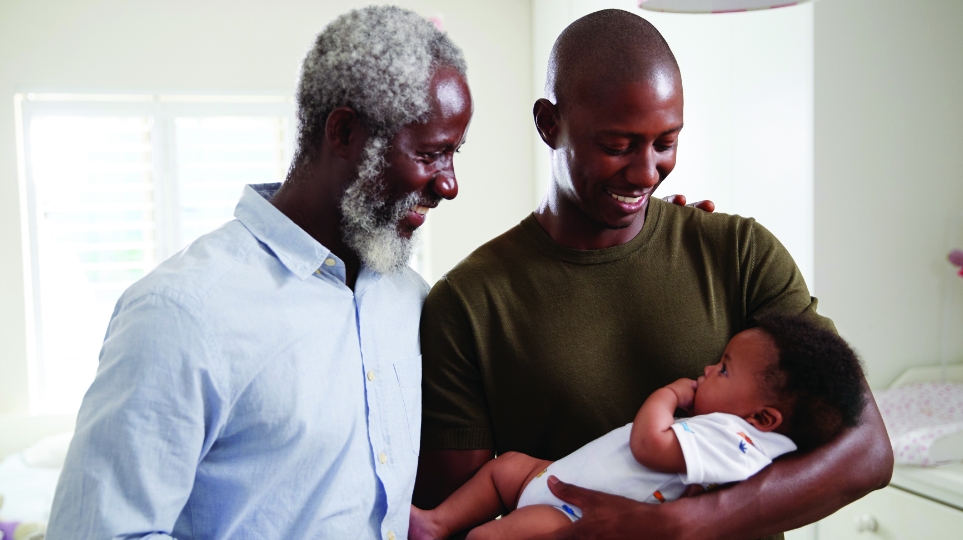Philanthropy is part of the early childhood ecosystem. We might have the power of wealth, but our partners in the field have the superpower of know-how. This is why our early childhood investments and initiatives are driven by the experiences and expertise of “proximity experts” — those who are closest to young children. The more we yield and follow their lead, the deeper the impact.
For example . . .

D.C. MEN IN ECE
In 2021, we responded to partners who wanted time and space to discuss the unique challenges men in the early childhood field experience: Men like Jamal Berry, a self-described “infant-toddler whisperer,” the CEO of Educare DC, and a member of “Que Dog,” an Omega Psi Phi Fraternity, Inc.; or men such as Austin Lee, an early childhood educator at Tiny Findings Child Development Center. Nationwide, men make up 3% of the overall early childhood workforce; men of color less than 1%. We anticipated a few convenings for 50 men to connect and share their experiences. Instead, with the DC Early Learning Collaborative serving as an anchor, the network now has roughly 200 men. Their focus includes improving the recruitment, retention and advancement of men in early childhood, with special attention to ethnic and racial diversity and increased educational outcomes for children. As one participant said after attending the groupʼs inaugural conference in October 2023, “Yes, yes. I am consistently amazed and inspired by the work and vision of the DC Men in Early Childhood Education (ECE) group. Last nightʼs event was superb in showcasing the strategy in place for recruiting, retaining, and advancing men in this field.”
D.C. EARLY LEARNING SUPPORT GRANT
Our partners told us about the lack of and inequitable access to public funds for early learning programs in home-based settings. Many factors contribute to this shortfall, including administrative burden, language barriers, under-resourced fiscal and technology infrastructure, and distrust of government. In response, the Reinvestment Fund, in collaboration with DC Family Child Care Association and The Multicultural Spanish Speaking Providers Association, designed and administered the Early Learning Support Grant. Licensed early learning programs in home-based settings received grants up to $5,000 to improve the quality and safety of their facilities. Technical assistance, pop-up workshops, applications, and materials were provided in English and Spanish. Grant recipients were given the autonomy to prioritize the technical assistance and resources they needed to create a quality environment. We anticipated reaching 60% of eligible programs. Instead, more than 90% of eligible programs, serving 577 young children, received funding. Over 90% of grantees were women-owned businesses, 27% identified as Latino, and 61% identified as Black.
DC EARLY EDUCATOR EXPERIENCE
Our D.C. partners said early childhood educators wanted more opportunities to connect, network, celebrate, and earn required professional development hours. Given that the well-being and competence of early childhood educators are the most important ingredients for quality early learning, we leaned in with the D.C. Association for the Education of Young Children, D.C. Head Start Association, D.C. Family Child Care Association, and the Multicultural Spanish Speaking Providers to launch DC Early EdX in 2021. Due to the pandemic, we anticipated a professional development event for 250 educators and, frankly, we had our fingers crossed. Over 1,100 early childhood professionals attended, with attendance growing to 1,500 the second year. In 2023, we offered a hybrid experience, adding an in-person option for the first time. We drew more than 1,300 early childhood professionals, who earned 6,120 professional development hours. Of those surveyed, 90% plan to attend the 2024 event and 94% feel more connected to the purpose of their work.
These stories are a few out of many we used to measure impact by metrics we created in isolation.

We have shifted the paradigm so that the paramount question today is: How effectively are we responding to the priorities of our partners and “proximity experts?” Weʼre getting there. And educators and the children they serve are benefiting as a result.